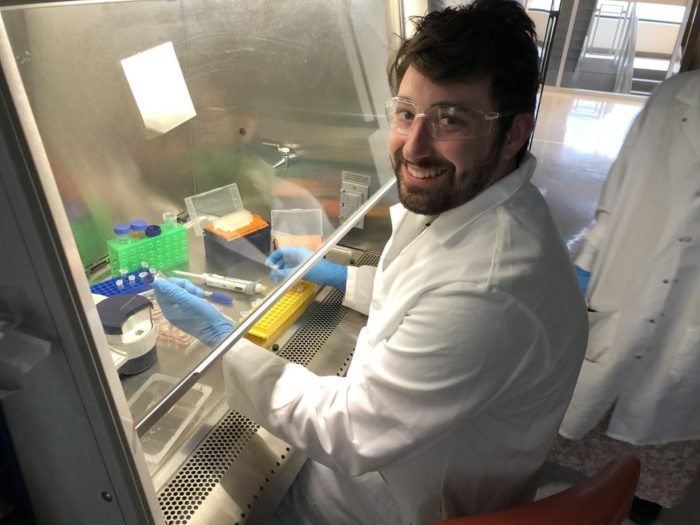Biotech students get real-world experience at industry labs
Benjamin Tero works in a research lab focusing on cardiovascular disease at Maine Medical Center Research Institute, where he grows human cells and conducts experiments on the connection between fat tissue and cardiovascular health.
Tero had lots of lab experience when he started his Master of Science in biotechnology program, in 2021. This spring, he gained much more in a course providing experiential learning opportunities at three biotech labs in Maine: Bigelow Laboratory for Ocean Sciences, MDI Biological Laboratory, and The Jackson Laboratory.
Academic leaders in the Roux biotechnology program partnered with the labs to design the modules. The course, the second in a two-course sequence, embodied the spirit of the Roux Institute’s mission: working with partners to co-create learning opportunities and research collaborations that grow talent and spur innovation in Maine.

(Image: Benjamin Tero prepares to deliver a plasmid—a piece of DNA containing genetic content—designed to alter the gene expression of a parasite that infects oysters, during an experiment at Bigelow Laboratory for Ocean Sciences in March.)
Biotech industry immersion
Students visited each lab for a three-day weekend. They did research experiments, presented their work, toured the facilities, and heard lectures and panels on career opportunities. The labs’ research scientists and leadership taught the modules and provided instruction, alongside Roux faculty.
Before each visit, students read research materials to prepare. Afterwards, they were quizzed on the experience and wrote reflection papers.
Tero says he gained deeper knowledge of research methods, learned new lab skills, and realized how to apply familiar techniques in new ways. At MDIBL, he recognized how an image processing method used to observe how shrimp move could be used to monitor cell growth. At Jackson Laboratory, he learned how to properly handle mice during experiments.
“In my job, I learn what I need to know for a specific experiment,” says Tero, a full-time research assistant at Maine Medical Center Research Institute who is doing his graduate program part time. “But I’ve realized how to apply these techniques in other ways and built a foundation of knowledge that will carry forward in my current job and career.”
Laura Brown, another student in the course who also works full time, as a scientist at EnviroLogix, described the course’s real-world lab experience as “invaluable.” “You can read a procedure, but until you do it yourself, you don’t make all the connections and understand the whole process,” she says.
New skills, networks, and opportunities
Michael Wilczek, a postdoctoral research fellow and instructor at the Roux Institute, led the three-credit course, “Biotechnology Applications Laboratory.” He says the students strengthened their skillsets, expanded their professional connections, and experienced new types of jobs in biotech.
“Students don’t just learn about biotechnology. They gain experience from professionals working in the field,” says Wilczek, “They’re also getting exposure to new companies and different perspectives in this industry.”
The course builds upon one offered this past fall, called “Basic Biotechnology Lab Skills,” grounded in foundational biotech competencies. Wilczek also led that course, which similarly featured experiential learning-based modules with partners at the University of New England, the University of Southern Maine, Maine Medical Center Research Institute, and IDEXX.
The two-course sequence not only advanced students in terms of their learning but aided in efforts to cultivate an intentional biotechnology network across the state to support workforce development.
“I’m so pleased that we are partnering with the Roux Institute to help grow and develop the biotechnology workforce in Maine,” says Karen L. Houseknecht, professor and associate provost for research and scholarship at the University of New England. “It was a pleasure to welcome these students to UNE’s School of Pharmacy laboratory to practice foundational laboratory skills and share experience and application to the pharmaceutical and biotech industries.”